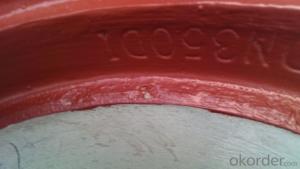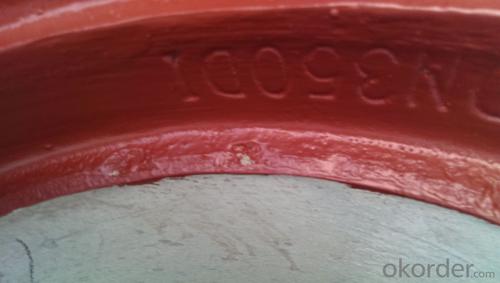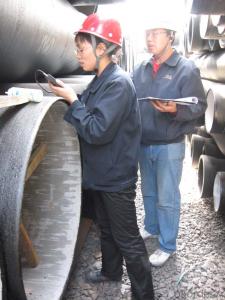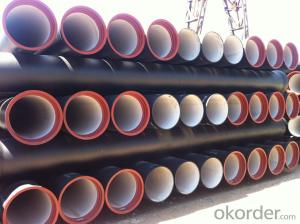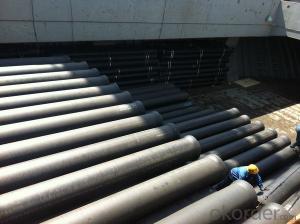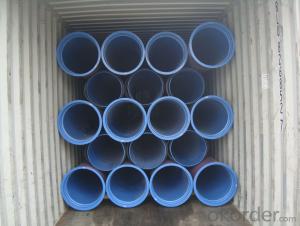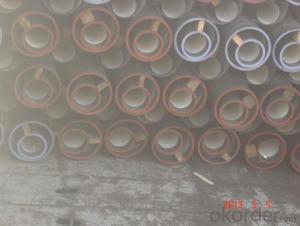T Type Ductile Iron Pipe DN400 socket spigot pipe
- Loading Port:
- Tianjin
- Payment Terms:
- TT OR LC
- Min Order Qty:
- 25
- Supply Capability:
- 30000 /month
OKorder Service Pledge
OKorder Financial Service
You Might Also Like
1) The standard of pipe: ISO2531:1998, EN545:2006,K9 K8
2) Effective length: 6m/5.7m
3) Inner cement line: Portland cement lineas per ISO4179
4) Zinc coating: at least 130g/m2 as per ISO8179
5) Bitumen painting: at least 70μm as per ISO8179
6)With 102% quantity of NBR, SBR, or EPDM ring asper ISO4633
7) DN80-DN1200
8) Highstrength, lighter than grey iron, good corrosion resistance, no furring, smallflow resistance, easy fixing, long life tome about 100 yeas
9)Checked by automatic inspection equipment
10) Composition:
Chemical composition | |||
Chemical composition | Ductile Cast Iron Pipe (%) | Grey iron pipe (%) | Steel pipe (%) |
C | 3.5-4.0 | 3.2-3.8 | 0.1-0.2 |
Si | 1.9-2.6 | 1.4-2.2 | 0.15-0.4 |
Mn | 0.15-0.45 | 0.4-0.6 | 0.3-0.6 |
P | ≤0.06 | ≤0.3 | 0.02-0.03 |
S | ≤0.02 | ≤0.1 | 0.02-0.03 |
Mg | 0.03-0.06 |
|
|
11) Feature:
Mechanical properties | |||
| Ductile Cast Iron Pipe | Grey Iron Pipe | Steel Pipe |
Tensile Strength(Mpa) | ≥420 | 150-260 | ≥400 |
Yield Strength(Mpa) | ≥300 | No Confirmation | No Confirmation |
Bending Strength(Mpa) | ≥590 | 200-360 | ≥400 |
Elongation (%) | ≥10 | Neglected | ≥18 |
Brinell Hardness(HBS) | ≤230 | ≤230 | About 140 |
12) T type mechanical joint
13) Packing: in bulk or container
PACKING: 1) Pipesare bundled together with the steel belt.
2) Wooden pieces are put between the pipes.
- Q: How do ductile iron pipes handle pressure surges in pumping stations?
- Ductile iron pipes are known for their strength and durability, making them well-equipped to handle pressure surges in pumping stations. These pipes have a high resistance to impact and are designed to withstand the sudden increase in pressure that occurs during surge events. Additionally, their flexible nature allows them to absorb and distribute the force exerted by the surge, minimizing the risk of pipe failure or damage. Overall, ductile iron pipes are a reliable choice for handling pressure surges in pumping stations.
- Q: Are ductile iron pipes suitable for use in geothermal applications?
- Geothermal applications can benefit from the use of ductile iron pipes. These pipes possess qualities such as strength, durability, and corrosion resistance, which are crucial for geothermal systems. In the realm of geothermal systems, which involve utilizing the Earth's heat for energy generation or building heating and cooling, ductile iron pipes are well-regarded. They are capable of enduring high temperatures and pressures without compromising their structural integrity. This ability to withstand thermal expansion and contraction ensures a dependable and long-lasting piping solution. Moreover, ductile iron pipes exhibit exceptional resistance to corrosion, making them ideal for the potentially corrosive environment often encountered in geothermal applications. This resistance guarantees that the pipes will not deteriorate over time, thus maintaining the system's integrity and minimizing the risk of leaks or failures. Additionally, ductile iron pipes possess a smooth interior surface, which aids in reducing pressure loss and energy consumption in geothermal systems. The smoothness of these pipes also lowers the likelihood of mineral deposits or scaling buildup, promoting efficient and uninterrupted heat transfer. All in all, ductile iron pipes prove to be a suitable choice for geothermal applications due to their strength, durability, corrosion resistance, thermal stability, and smooth interior surface. They offer a reliable and efficient piping solution capable of withstanding the demanding conditions of geothermal systems while ensuring long-term performance and minimal maintenance requirements.
- Q: How are ductile iron pipes restrained against axial thrust forces?
- Ductile iron pipes are restrained against axial thrust forces through a combination of mechanical restraints and soil resistance. One common method of restraining axial thrust forces is by using thrust blocks. Thrust blocks are concrete structures that are built at bends, tees, and other locations where changes in direction occur in the pipeline. These blocks are designed to resist the axial forces and prevent the pipes from shifting or moving due to the pressure exerted by the flowing fluid. Additionally, mechanical restraints such as pipe restraints, thrust collars, and anchor blocks are used to provide further support and prevent axial movement. Pipe restraints are devices that are installed around the pipe and connected to adjacent structures, such as walls or concrete collars, to prevent movement. Thrust collars are also used to absorb and distribute the thrust forces generated by the flowing fluid. These collars are typically made of ductile iron or steel and are secured around the pipe to resist axial movement. Furthermore, soil resistance plays a significant role in restraining axial thrust forces. The weight of the soil surrounding the pipe creates frictional resistance, which helps counteract the axial forces. Proper trench backfilling, compaction, and adequate embedment of the pipe in the soil are essential to ensure effective soil resistance. In summary, ductile iron pipes are restrained against axial thrust forces through a combination of mechanical restraints such as thrust blocks, pipe restraints, and thrust collars, as well as soil resistance provided by proper trench backfilling and compaction. This comprehensive approach ensures that the pipes remain securely in place and can withstand the axial forces generated by the fluid flowing through them.
- Q: Does the cast iron pipe for spheroidal graphite need corrosion protection when laying underground?
- In quality, the spheroidization of cast iron pipes is controlled to be 1-3 (spheroidization rate 80%), so the mechanical properties of the cast iron pipes, ductile iron pipes and finished product libraries can be better improved, with the nature of iron and the properties of steel
- Q: How do ductile iron pipes perform in extreme weather conditions?
- Ductile iron pipes are renowned for their outstanding performance when faced with harsh weather conditions. Crafted from an iron alloy infused with small quantities of carbon and other elements, these pipes exhibit unparalleled strength and resilience, rendering them highly impervious to the effects of extreme weather. In soaring temperatures, ductile iron pipes maintain their structural integrity without succumbing to softening or deformation, unlike certain other materials. This ensures that the pipes continue to function optimally and reliably, even in scorching heat. Furthermore, these pipes boast a remarkable resistance to thermal expansion, thereby minimizing the risk of pipe distortion or joint failure during temperature fluctuations. When confronted with frigid conditions, ductile iron pipes also excel. They possess a low coefficient of thermal expansion, translating to a reduced likelihood of cracking or fracturing due to freezing temperatures. Moreover, their robustness and flexibility enable them to withstand the pressure exerted by freezing water inside the pipes without incurring significant damage. In addition, ductile iron pipes exhibit superb corrosion resistance, demonstrating their ability to withstand the detrimental effects of harsh chemicals, saltwater, and other corrosive substances that may be present in extreme weather conditions. This corrosion resistance ensures the longevity and dependability of the pipes, preventing leaks and preserving water quality. In terms of durability, ductile iron pipes are designed to endure heavy loads and external stresses. Boasting high tensile strength, they display resistance to bending and breakage. This characteristic proves crucial in extreme weather conditions where heavy rainfall, powerful winds, or even seismic activities may occur. All in all, ductile iron pipes have a well-established reputation for delivering exceptional performance in extreme weather conditions. Their strength, resilience, thermal stability, corrosion resistance, and durability render them a reliable choice for a multitude of applications, including water supply, sewage systems, and industrial pipelines, even in the most challenging weather environments.
- Q: How are leaks repaired in ductile iron pipe?
- Leak repairs in ductile iron pipes vary depending on the severity and location of the leak. One technique commonly used involves the application of epoxy-based sealants or leak repair clamps. For small leaks, epoxy sealants are commonly utilized. A specialized epoxy compound is applied to the leaking area, which then hardens and forms a durable seal. The epoxy is carefully spread on the pipe's surface, covering the leak and any surrounding damage. This method effectively addresses small leaks and offers a long-lasting solution. In cases where the leak is larger or more severe, leak repair clamps are often utilized. These clamps secure tightly around the pipe using rubber gaskets and bolts to provide a mechanical seal. The clamp's pressure compresses the gasket onto the pipe, creating a watertight seal and preventing further leakage. Leak repair clamps come in various sizes to accommodate different pipe diameters. Proper preparation of the pipe surface is crucial before applying either repair method. The area around the leak must be thoroughly cleaned and dried to ensure good adhesion of the epoxy or proper sealing with the clamp. It is also essential to adhere to the manufacturer's instructions and guidelines for the chosen repair method to achieve a successful and long-lasting repair. It is important to note that these repair methods are temporary solutions and may not be suitable for all situations. In cases of extensive pipe damage or aging infrastructure, it may be necessary to replace the affected pipe section entirely. It is recommended to seek professional assessment and guidance from qualified technicians or plumbers when dealing with leaks in ductile iron pipes. This ensures proper repairs and minimizes the risk of future issues.
- Q: What are the different sizes of ductile iron pipes available?
- The sizes of ductile iron pipes available vary depending on the specific needs and requirements of a project. Common sizes range from 4 inches to 64 inches in diameter, with larger sizes also available for specialized applications.
- Q: What are the typical bedding and backfill requirements for ductile iron pipes?
- The typical bedding and backfill requirements for ductile iron pipes are important to ensure the proper installation and long-term performance of the pipes. Generally, the bedding material should be a granular material that provides support and uniform load distribution to the pipe. This can include materials such as sand, gravel, or crushed stone. The bedding material should be placed in a continuous and uniform layer along the bottom of the trench, with a minimum thickness of 6 inches. The width of the bedding layer should be at least 1.5 times the outside diameter of the pipe, or as specified by the pipe manufacturer. Backfill material is used to fill the remaining space around the pipe after the bedding is in place. The backfill material should also be a granular material, free from large stones, debris, or organic matter. It should be compacted in layers around the pipe, typically in 6-inch increments, using appropriate compaction equipment. The backfill should be placed evenly around the pipe, ensuring that there are no voids or gaps. It is important to avoid excessive compaction that could lead to damage or deformation of the pipe. The backfill material should extend above the top of the pipe to provide a minimum of 12 inches of cover. In addition to the bedding and backfill requirements, it is essential to follow any specific guidelines provided by the pipe manufacturer. These guidelines may include recommendations for specific materials, compaction methods, or additional protective measures. Overall, the proper bedding and backfilling of ductile iron pipes is crucial for maintaining the structural integrity and preventing damage or failure of the pipe system. Adhering to industry standards and manufacturer specifications ensures the longevity and performance of the pipes in various applications.
- Q: Are ductile iron pipes suitable for wastewater pumping stations?
- Yes, ductile iron pipes are suitable for wastewater pumping stations. Ductile iron has high tensile strength, durability, and corrosion resistance, making it ideal for handling the abrasive and corrosive nature of wastewater. Additionally, ductile iron pipes have excellent pressure-bearing capabilities, ensuring reliable and efficient operation in wastewater pumping stations.
- Q: Can ductile iron pipes be used for water treatment facilities?
- Yes, ductile iron pipes can be used for water treatment facilities. Ductile iron is a type of cast iron that has enhanced strength, flexibility, and durability. These properties make it suitable for use in various applications, including water treatment facilities. Ductile iron pipes have excellent corrosion resistance, which is crucial in water treatment facilities where the pipes come in contact with different chemicals and water contaminants. They can withstand the harsh conditions and chemicals found in water treatment processes, ensuring a long service life. Moreover, ductile iron pipes have high tensile strength and are capable of withstanding high pressure. This makes them suitable for carrying the water throughout the facility, including the distribution system, pumping stations, and treatment units. They can handle the required flow rates and pressures without compromising the integrity of the pipes. In addition, ductile iron pipes are known for their flexibility and resilience. They can withstand ground movement and other external stresses, minimizing the risk of pipe failures and leaks. This is important in water treatment facilities where pipes often pass through different terrains and undergo frequent maintenance activities. Furthermore, ductile iron pipes are cost-effective compared to other alternative pipe materials like steel or PVC. They have a long life span, require minimal maintenance, and have low failure rates, reducing the overall operational and maintenance costs for water treatment facilities. Overall, ductile iron pipes offer a reliable and durable solution for water treatment facilities. Their corrosion resistance, high tensile strength, flexibility, and cost-effectiveness make them a suitable choice for transporting water and chemicals within the facility, ensuring efficient and effective water treatment processes.
Send your message to us
T Type Ductile Iron Pipe DN400 socket spigot pipe
- Loading Port:
- Tianjin
- Payment Terms:
- TT OR LC
- Min Order Qty:
- 25
- Supply Capability:
- 30000 /month
OKorder Service Pledge
OKorder Financial Service
Similar products
Hot products
Hot Searches
Related keywords
